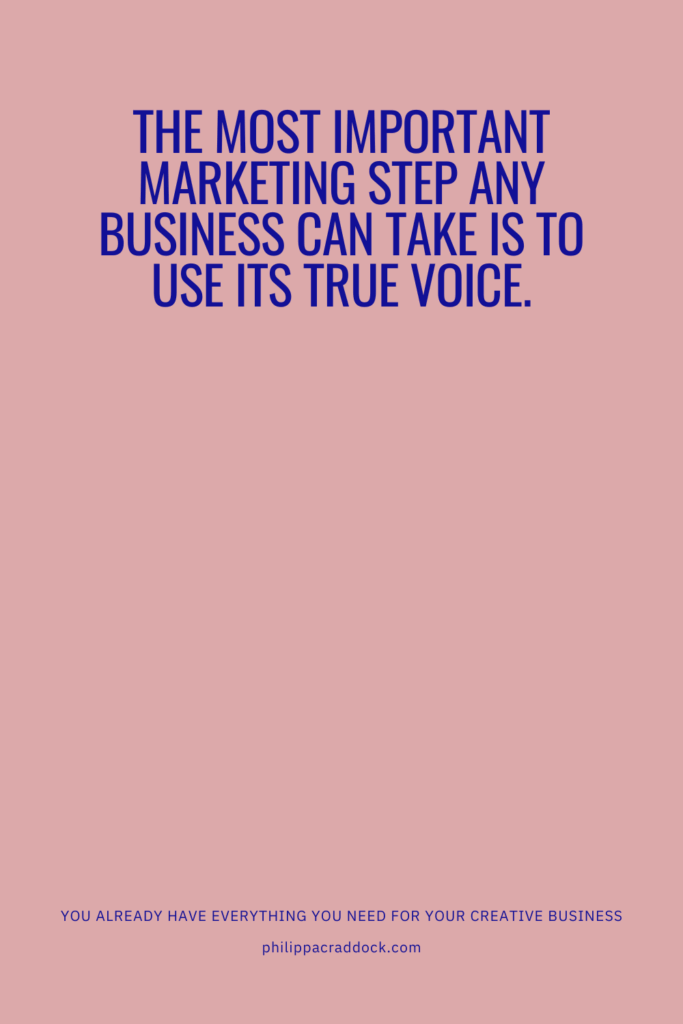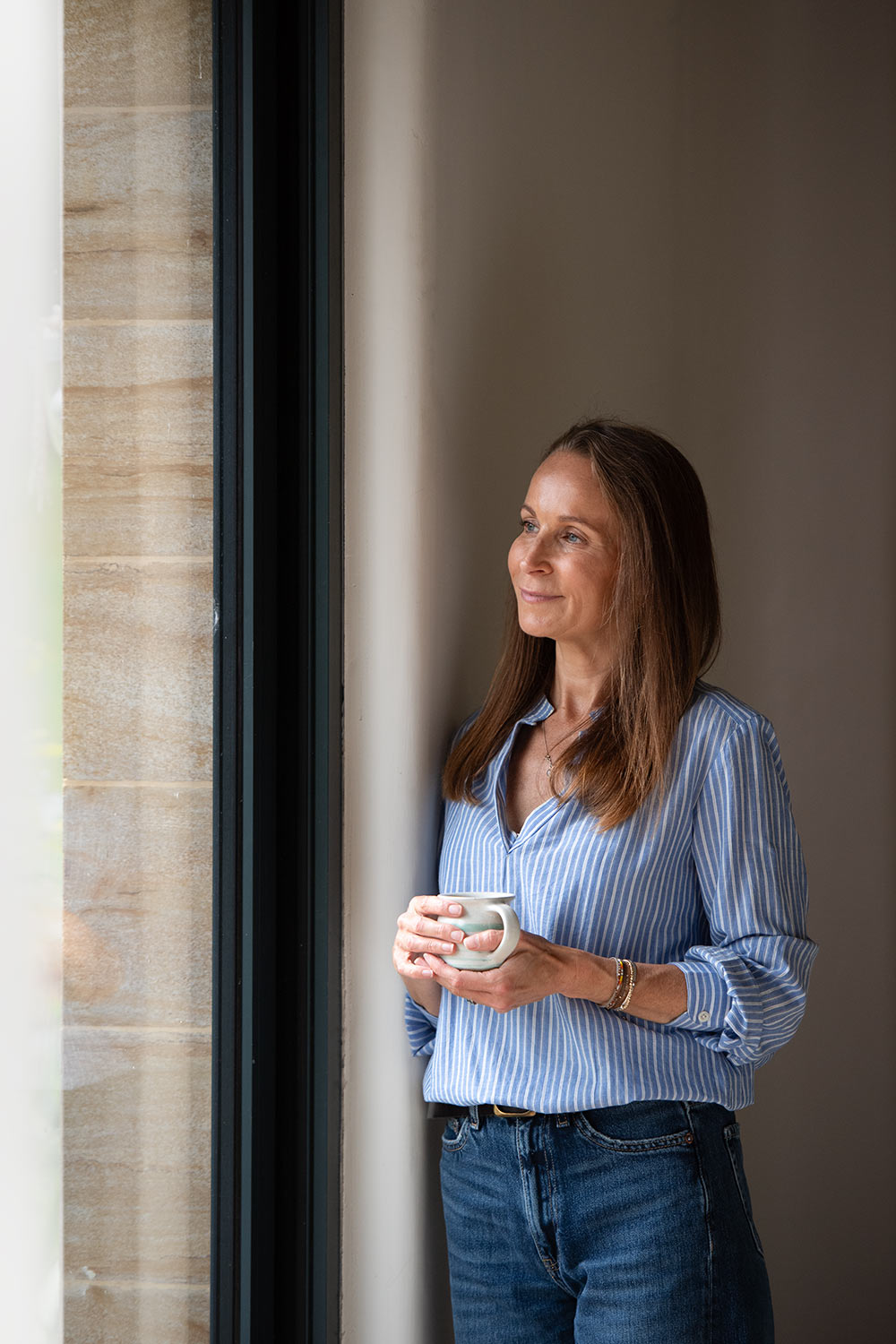Being yourself in business is one of the most powerful advantages you have. In this post and 20‑minute podcast episode, we’ll look at how authentic marketing and using your true voice can naturally attract the right clients, build real trust, and make running your business feel far more effortless.

How Authentic Communication Makes You More Professional
Last week we talked about thoughtful persistence and why silence doesn’t mean no. One of the key points we covered was that your gentle, considerate nature is a huge strength when you channel it into thoughtful, value-driven communication.
And this brought up the next conversation… how do you balance being authentic with being professional in your business communications?
I see so many talented creative entrepreneurs struggling with this balance. Often they worry they sound too casual and unprofessional, so they try to write in this overly formal way that doesn’t sound like them at all. Or they feel like they have to put on this “business persona” that feels completely exhausting to maintain.
Honestly? I struggled with this for such a long time myself. Particularly because of my dyslexia, I really struggled with writing and therefore focused on what I thought was a more professional tone. But looking back, I can see how this actually held me back from building the kinds of relationships that led to my most successful projects.
Today I want to share what I’ve learnt about finding that balance, being genuinely yourself while still being professional. Because when done thoughtfully, authenticity makes you much more professional, more memorable, and definitely more successful.
The Professional Mask We Think We Need
When you’re building a creative business, there’s this pressure to sound “professional” in a way that often doesn’t feel like you at all.
You know what I mean – those emails where you write things like “I hope this correspondence finds you well” or “Please do not hesitate to contact me should you require any further clarification.” It’s technically correct, but it sounds a little like it was written by a robot!
I spent years writing like this because I thought that’s what being professional meant. I thought I had to hide my personality, my enthusiasm, even my uncertainties, in order to be taken seriously.
And this approach was actually making my communication less effective, not more. Because when you’re hiding behind overly formal language, you’re not building genuine connections. And business, especially creative business, is fundamentally about relationships.
The Turning Point: Learning from Elisa
I want to share a story that completely changed how I think about professional communication, because it shows just how powerful authentic professionalism can be.
I was working with an amazing Sardinian event planner called Elisa Mocci. She was running a hugely successful business, working with high-end international clients, absolutely at the top of her field. But her communication style was completely different from what I’d been told was “professional.”
Maybe because she’s Sardinian, she had this wonderfully warm, down-to-earth approach that I immediately related to. She was honest, direct, and shared the same level of excitement about our projects that I felt. When we spent several days together in Sardinia looking at venues for an upcoming event, I got to experience what it was like to feel genuinely on par with a client.
She taught me something invaluable… that when you communicate authentically and people feel comfortable with you, everything becomes easier. You can place all your energy into the creativity of the project instead of maintaining this professional facade. The work becomes better, the relationship becomes stronger, and honestly, it becomes so much more enjoyable.
What struck me most about Elisa was that she was completely herself… warm, enthusiastic, honest; and yet she was absolutely professional. She delivered exceptional work, communicated clearly about timelines and expectations, and ran her business impeccably.
Being so down to earth and authentic made her more effective.
The Cost of Hiding Behind Formality
Looking back at my own journey, I can see how trying to sound overly professional was actually holding me back in several ways.
First, it was exhausting. Constantly monitoring how I sounded, trying to write in a way that didn’t feel natural – it took so much energy that could have been better spent on the actual work.
Second, it wasn’t building the right relationships. My most successful projects were always with clients I genuinely liked and felt comfortable with. When I was being more myself, I was attracting people who appreciated that authenticity.
And third, it wasn’t even more professional. Those stilted, formal emails weren’t impressive, they were forgettable. They didn’t stand out, they didn’t build connection, and they certainly didn’t showcase the creativity and personality that are actually my biggest business assets.
What Authentic Professionalism Looks Like
So what does it mean to be authentically professional? It’s about being genuinely yourself while still being thoughtful, reliable, and respectful.
It means writing the way you talk, but with intention. It means sharing your enthusiasm about projects without oversharing personal details. It means being honest about what you can and can’t do, and when you don’t know something.
For me, this shift happened gradually as I started writing newsletters several years ago. I began to relax into a more natural tone, and I noticed that people responded so much better to the real me than to the overly formal version I’d been presenting.
Now when I write an email to a client, it sounds like me. I might say “I’m so excited about this project” instead of “I am pleased to confirm the date.” I’ll admit when something is outside my expertise instead of trying to sound like I know everything. I’ll share a relevant insight or idea that occurs to me, even if it’s not directly related to the project at hand.
And what’s fascinating, this approach has made me more professional, definitely not less. Because when you’re being authentic, you’re more likely to catch problems early, communicate clearly about challenges, and build the kind of trust that leads to exceptional work.
Finding Your Boundaries
Now, being down to earth and authentic doesn’t mean sharing everything. Part of being professional is understanding what to share and what to keep private.
I think about this in terms of what’s genuinely helpful for my audience or clients, balanced with what makes me feel comfortable to share. For example, I’ll share challenges I’ve faced in business because I know others are dealing with similar things. But I won’t share every personal detail of my life.
Your boundaries might be different from mine, and that’s completely fine. The key is being intentional about what you share rather than either hiding everything or oversharing without thought.
The Practical Shift: Writing as You Talk
The most practical advice I can give you is this: write as you talk.
When you’re drafting an email to a client, imagine you’re having a conversation with them. What would you actually say? How would you explain this concept to a friend? What words would you naturally use?
This doesn’t mean being casual to the point of unprofessional. It means being conversational while still being clear, helpful, and respectful.
If you feel stilted when you write, try speaking your message out loud first. Record yourself explaining what you want to say, then use that as the basis for your written communication. You’ll be amazed at how much more natural and engaging it sounds.
Overcoming the Fear Factor
I know that some people might be worried that being more authentic will turn off “serious” clients or make you seem less credible. I understand this fear because I definitely felt it too.
But you want to attract like-minded people anyway. These are the people it’ll be so much more enjoyable to work with. When you’re authentic, everything becomes easier… your marketing, your communication, your customer service, even writing product descriptions.
The clients who are put off by your authentic professional voice probably weren’t the right fit anyway. And the ones who appreciate it? Those become your best relationships, your most successful projects, and often your biggest advocates.
The Dyslexia Journey: When Vulnerability Becomes Strength
I mentioned earlier that my dyslexia affected my writing confidence for years. I was so worried about making mistakes that I hid behind overly formal language that felt safer.
But at some point, I stopped worrying about it. I realised that being honest about this struggle actually made me more relatable. So many people in my audience are also dyslexic, or they have other challenges. When I’m open about this, it gives them permission to be imperfect too.
This honesty has become one of my strengths, not a weakness. It shows that you don’t have to be perfect to be professional. You just have to be genuine, thoughtful, and committed to doing great work.
Why Your Real Voice Matters More Than Ever
There’s also something else that’s really important to consider, especially right now. In a world where AI can generate endless amounts of generic, polished content, your real voice has never been more valuable.
People are craving authentic connection. They want to communicate and work with people who have genuine perspectives, who bring their own experiences and insights to their work.
But there’s definitely a challenge, if you’re constantly reading what others in your industry write, it’s easy to start sounding like everyone else. My advice is to stay aware of what’s happening in your field, but make sure you’re sharing your own perspective on things. Don’t just repeat what everyone else is saying.
Your unique voice, your particular way of seeing things, your specific experiences, these are your competitive advantages. When you try to sound like everyone else, you’re giving up the very thing that makes you irreplaceable.
What This Means for Your Business
When you start communicating more authentically, several things happen.
First, you attract better clients. The people who respond to your authentic voice are more likely to be people you genuinely enjoy working with.
Second, your work becomes more effective. When clients feel comfortable with you, they share more information, give better feedback, and trust your expertise more readily.
Third, you stand out from the competition. In a sea of generic, formal business communication, authenticity is memorable.
And finally, it becomes sustainable. You’re not exhausting yourself trying to maintain a persona that isn’t really you.
Moving Forward
I want to leave you with this thought: you are valuable exactly as you are. Your unique voice, your particular perspective, your way of seeing and explaining things – these are your greatest professional assets.
As we are seeing more and more generic content, the creative entrepreneurs who thrive are the ones who have the courage to be genuinely themselves while still being thoughtful, reliable, and excellent at what they do.
You don’t need to choose between being authentic and being professional. When done thoughtfully, they’re the same thing.

Comments +